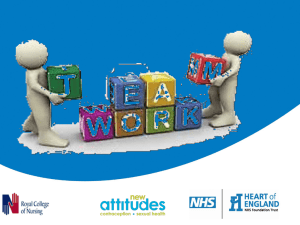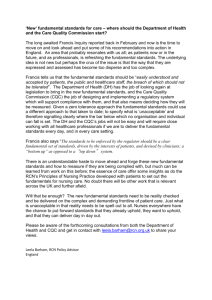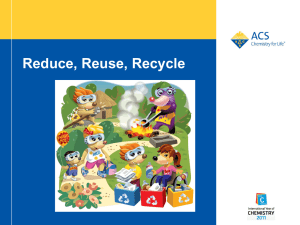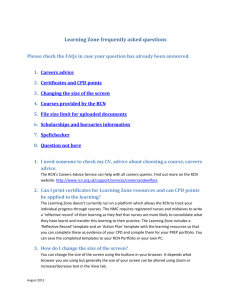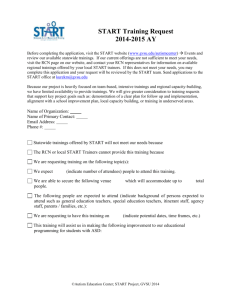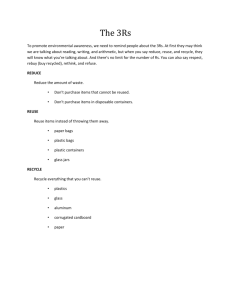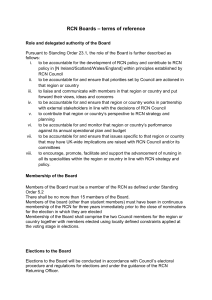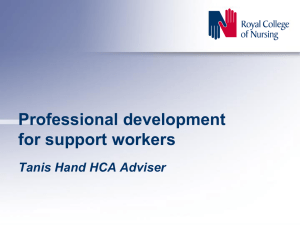PA 395 Non-Profits & the Environment
advertisement
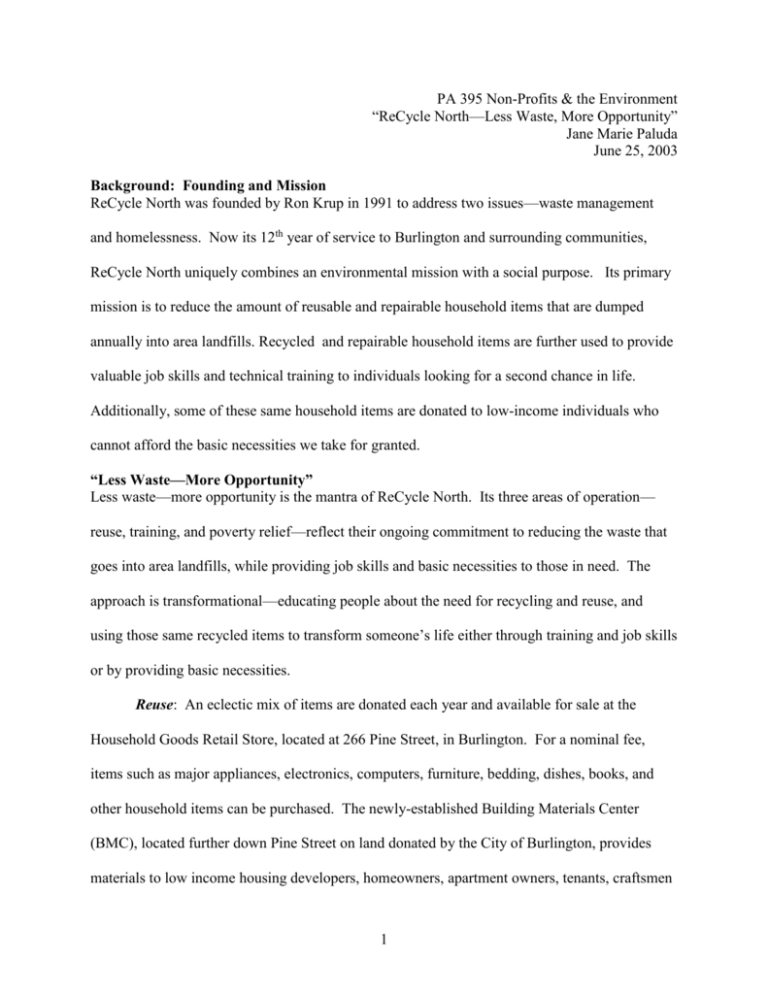
PA 395 Non-Profits & the Environment “ReCycle North—Less Waste, More Opportunity” Jane Marie Paluda June 25, 2003 Background: Founding and Mission ReCycle North was founded by Ron Krup in 1991 to address two issues—waste management and homelessness. Now its 12th year of service to Burlington and surrounding communities, ReCycle North uniquely combines an environmental mission with a social purpose. Its primary mission is to reduce the amount of reusable and repairable household items that are dumped annually into area landfills. Recycled and repairable household items are further used to provide valuable job skills and technical training to individuals looking for a second chance in life. Additionally, some of these same household items are donated to low-income individuals who cannot afford the basic necessities we take for granted. “Less Waste—More Opportunity” Less waste—more opportunity is the mantra of ReCycle North. Its three areas of operation— reuse, training, and poverty relief—reflect their ongoing commitment to reducing the waste that goes into area landfills, while providing job skills and basic necessities to those in need. The approach is transformational—educating people about the need for recycling and reuse, and using those same recycled items to transform someone’s life either through training and job skills or by providing basic necessities. Reuse: An eclectic mix of items are donated each year and available for sale at the Household Goods Retail Store, located at 266 Pine Street, in Burlington. For a nominal fee, items such as major appliances, electronics, computers, furniture, bedding, dishes, books, and other household items can be purchased. The newly-established Building Materials Center (BMC), located further down Pine Street on land donated by the City of Burlington, provides materials to low income housing developers, homeowners, apartment owners, tenants, craftsmen 1 and artisans to improve their homes and communities at an affordable price. Building materials that would have otherwise gone to a landfill, are now recycled with the intent for purchase and reuse. Doors, windows, sinks, lighting, lumber, cabinets, and countertops are just a few of the items that can be purchased at the BMC. Since 1991, reuse operations have generated a total of $4.3 million. In 2002, reuse operations generated net sales totaling $829,446. The breakdown of activity in 2002 includes: Diverted $642,206 worth of appliances, electronics, computers, household goods, and furniture from area landfills. Reused $125,928 worth of building materials through the BMC. Earned $122,966 through the completion of 34 deconstruction jobs. Found new homes for $3,159 of remnants, manufacturing by-products, and other art supplies through the Artcycle Center, in partnership with Burlington City Arts. Reused 193 refrigerators, 12 freezers, 177 washers, 124 dryers, 73 stoves, 24 air conditioners, 8 dehumidifiers, and 97 microwaves. Repaired, sold, or gave away 178 televisions and 223 stereo components. Refurbished, sold, or gave away 934 computers and computer components. Shipped 802 dead computer monitors (weighing 21,473 lbs) and hundreds of circuit boards (1,397 lbs) to a demanufacturer in Massachusetts. So why are the net sales figures important to understand? The sales figures are used to quantify the reduction of solid waste in area landfills. According to Paul Lamberson, Marketing and Outreach Director, “Landfills measure solid waste in terms of weight such as yards or tons. At ReCycle North, we can’t measure the weight of all the items we accept, repair, and resell. So the measure we use is in terms of sales.” The dollar amounts help to quantify the annual reduction in solid waste. The numbers speak for themselves. Without ReCycle North, much more solid waste would end up in area landfills. A new computerized point-of-sale and inventory system was recently brought online to better track sales and manage inventories. In the future, it will be an efficient way to determine the net annual sales. 2 Training: ReCycle North offers opportunities to a range of individuals who need new skills and a chance to succeed. Three types of programs are available: the Apprentice-Style Training program serves career-oriented adults, while the Work Experience Training and Community Service Learning programs target individuals who are trying to find direction in their lives. Displaced or injured workers, homeless individuals, and out-of-school youth are served through the Apprentice-Style Training program. The program typically lasts six months and includes training in one of four areas: major appliance repair, computer systems technology, customer service and retail management, and office administration. On average, 35 individuals are accepted into the program annually. During my time at ReCycle North, I interacted with several individuals in the training program and witnessed young men repairing washing machines and computers. The Work Experience Training program is geared toward serving long-term unemployed adults, low-income youth, and individuals with disabilities. The programs typically run from 2 to 12 months and serve approximately 10 individuals annually. The Community Service Learning program serves approximately 800 individuals annually. The program is designed for individuals referred from the Department of Corrections and those on public assistance. The length of the program can vary from one day to two months. To ensure that the appropriate training program is available to individuals who will benefit from the skills learned, ReCycle North partners with area organizations such as VT Adult Learning, VT Associates for Training & Development, VT Department of Employment & Training, and VT Division of Vocational Rehabilitation. 3 All program trainees are treated as colleagues rather than as program participants. This was apparent during my time at RCN. I really couldn’t tell the difference between someone employed by RCN and someone in a training program. The majority of individuals I interacted with were male. I didn’t see any women working on computers or appliances. Training statistics for 2002 include: 17 individuals entered the Apprentice-Style Training Program; 53% graduated as scheduled; 40% of the graduates were employed 3 months after graduation. 27 individuals were served through the Work Experience Program. 205 offenders were served in community service opportunities. Poverty Relief: Each year, ReCycle North is committed to donating almost $50,000 of essential household goods to low income individuals, families, and non-profit organizations. RCN works with area agencies that service low-income populations. Vouchers good for RCN goods and services are provided to case workers who in turn provide them to their clients. Clients can shop at RCN for the items and services they need. In 2002, RCN provided $46,814 of essential household goods to almost 400 low-income individuals and families, and non-profit organizations. Their partner agencies include the Committee on Temporary Shelter, Howard Center for Human Services, The Lund Family Center, Visiting Nurses Association, Women Helping Battered Women, and others. What Works for ReCycle North Operating Budget/Financial Picture: Even though ReCycle North is a non-profit organization (501 C 3), it is entrepreneurial in nature and operates within an annual budget that projects a surplus. This year, its operating budget is $1.4 million, funded primarily through $1.2 million in revenue from sales, services, and donated goods. The remaining balance comes from donations, grants, and training income. In 2002, nearly 90 percent of funds were used for 4 program services (reuse, job training, or poverty relief), with 9.2 percent devoted to administration and general expenses, and 1.6 percent earmarked for fundraising and development efforts. In 2002, RCN ended the year with a surplus of $38,790. Part of the surplus was used to repay a $30,000 loan that helped finance the start-up of the Building Material Reuse enterprise. Organizational Structure: ReCycle North originally employed just a handful of full and part-time individuals. In 1996, they employed 10 people. Today, that number has increased to 30 employees. (See organizational chart in Appendix One.) The Executive Director reports to a nine-member Board of Directors who are active members in helping RCN achieve its goals. Board members represent area businesses and non-profit organizations such as Conant Custom Brass, IDX Corporation, and Vermont Youth Conservation Corps. The Board is “a set of eyes from the community” that makes sure RCN adheres to its mission. They are active in strategic planning and goal setting. However, they don’t necessarily get involved in the day-to-day operations. The Executive Director has the authority to make decisions according to his own discretion. The Board reviews financials on a monthly basis, and approves purchases over $1,000. From a fund-raising standpoint, board members are expected to sell tickets to RCN’s annual fundraiser and make RCN their primary charity when making their own charitable gifts. Strategic Planning/Goal Setting: As mentioned previously, ReCycle North approaches its work as an entrepreneurial organization. It creates an annual business plan that projects revenues, expenditures, and surpluses. Additionally, it sets goals for each of its strategic initiatives and periodically reviews progress toward those goals. A recent example of a strategic initiative and RCN’s entrepreneurial spirit is the opening of its Building Materials Center and its related deconstruction service. After conducting a 5 feasibility study, RCN determined the need to pursue this endeavor. Still in its start-up phase, and losing money, the BMC is slated to show a profit in future years. A carefully constructed business plan anticipated the loss, but it also shows gains being made in future years. RCN was willing to take the risk. They know the payoff will come in the years ahead, not just financially but in reducing the amount of building materials in area landfills. Another example of strategic direction and goal setting is RCN’s elimination of its electronics training program. Before the price in electronics plummeted, RCN offered an training program in electronics. Apprentices learned how to repair televisions, VCRs, and small electronics such as toasters, etc. In recent years, the price for new electronics fell. RCN found that it took more time and money to repair a VCR or toaster than it would have to purchase a new item. They made the decision to discontinue the program. They still accept TVs, VCRs, and small electronics. However, the experience has taught them to watch industry trends in order to continue to make informed decisions about its sales and training operations. Sharing Its Expertise: ReCycle North is known regionally and nationally for sharing its expertise with other non-profit organizations and associations. Staff members regularly speak at conferences and meetings sponsored by organizations such as the Northeast Recycling Council and the Used Building Material Conference. Locally, RCN takes an active role in attending and speaking at the Vermont Businesses for Social Responsibility Conference. In the past year, five organizations and/or communities have asked RCN to consult with them to develop successful social purpose enterprises based on the RCN model. “Balancing the time to do this type of consulting, along with the time needed to run a day-to-day operation is a challenge,” notes Lamberson. 6 Partnerships: Partnerships are an integral component of ReCycle North’s mission and its success. In its reuse and recycle division, partnerships with Fletcher Allen Hospital, for used computers, and Sears, for used appliances, are important for generating sales in its Household Goods/Appliances division. In its training division, partnerships with area training and education organizations such as the VT Department of Education and Training and adult learning and vocational centers are essential in finding the right individuals for RCN’s three training programs. To meet its annual goal of poverty relief, partnerships with organizations that service low-income individuals and families are key. Other partnerships like the one with Vermont Business Exchange (VBE) is also important. VBE is a clearinghouse for product exchanges. Recently, RCN received a commercial trade show booth. The booth would never sell in the store. So RCN networked with VBE to sell the booth to a Midwest business. RCN occasionally uses E-Bay to sell donated items, like laptop computers. Another partnership is the annual furniture exchange with UVM students. Organized jointly with the City of Burlington, UVM, and RCN, the exchange gives students the opportunity to set out furniture and other items, which would typically be discarded, in a designated area within Burlington. Other students and Burlington residents pick up items for their own use, thereby reducing the amount of trash taken to the landfill. RCN picks up the remaining, unwanted items and sells or repairs them in the Household Goods Store. “It’s a win-win situation for everyone,” notes Lamberson, especially since the trash generated by the UVM students became a public relations nightmare for UVM a few years ago. Setting Guidelines: Through experience, ReCycle North has learned to set guidelines for the acceptance of recycled items and for the types of individuals they will accept into their 7 training programs. Even with the best of good intentions, donors often leave unusable items at RCN. Monthly, RCN spends about $2,000 to trash unusable items. In recent years, they’ve become stricter with guidelines for what they will and will not accept and have implemented recommended “drop-off fees” for most items. The same is true for their training programs. Individuals are asked to apply and interview for their training programs. This ensures that the right individual is slated for the appropriate training program. For those they don’t accept, RCN just doesn’t close the door. Instead, they guide the individual to the appropriate services and programs in the community. Donors: Donors, rather than members, play an important part in sustaining ReCycle North’s operations. Donations of household goods and building materials, monetary donations, and time volunteered are all considered donations to RCN. All material and monetary donations are fully tax deductible and support the organization’s poverty relief and job training work. RCN is a 501 (c) (3) non-profit organization, which means a donor can deduct the value of all material donations and monetary donations from his/her federal income taxes. What Hasn’t Worked for ReCycle North Creating Educational Materials for Schools: A few years ago, ReCycle North embarked on creating educational materials for the fifth grade level in Vermont schools. An inordinate amount of staff time and money was spent on developing the materials to educate youth about recycling. A needs assessment was conducted, teachers were surveyed, and the Vermont standards were evaluated to provide guidelines for creating the educational materials. They realized too late in the process that the actual benefit of the program wasn’t worth the cost in both time and actual dollars being spent to produce the materials. They also realized this wasn’t something RCN should be doing. National organizations had already developed quality 8 materials for teachers to use for teaching about recycling. RCN decided not to be in this type of outreach for the future. Conclusion In the last 12 years, ReCycle North has evolved as an organization committed to making a difference in the local community while fulfilling its environmental mission to reduce solid waste. One wall in its meeting room is filled with awards from organizations such as the Vermont Association of Recyclers and Vermont Businesses for Social Responsibility. These awards recognize RCN’s continued commitment to its environmental and social missions. One might say that ReCycle North’s environmental philosophy is one focused on the homocentric ethic. It is grounded in society—everything it strives for has a social interest or social component. Its approach to environmental issues is transformational—educating people about the need for recycling and reuse, and how recycled items can transform someone’s life either through job training or by providing basic necessities that many of us take for granted. ReCycle North is truly a “socially responsible” enterprise with a focus not only on the financial bottom line, but also on the social and environmental bottom lines. 9 Appendix 1 (Organizational Chart shown in class presentation. Unfortunately, I don’t have the document electronically. I can send a copy via intercampus mail if you would like.) 10 Appendix 2 Questions for Recycle North Who was the founder? Is he/she currently involved in the organization? How / why / was Recycle North established? What’s is the mission? What are the goals of the organization? Is it strictly local or does it extend regionally? Are other local/regional/national organizations modeled after RCN? What approach has RCN taken to environmental issues? Adversarial – direct action/legal Transformational – lobbying, education, legal Exemplary – individual and collective action What strategies are used to succeed? Does fundraising play a role? What is the organizational structure? How many employees? Describe the types of activities/ideas that have worked? Describe the types of activities/ideas that haven’t worked? Explain reasons why they may not have worked. Is there an advisory board/board of directors? Who are your major partners? How do you measure a reduction in the amount of materials that would have ended up in a landfill if RCN didn’t exist? 11
